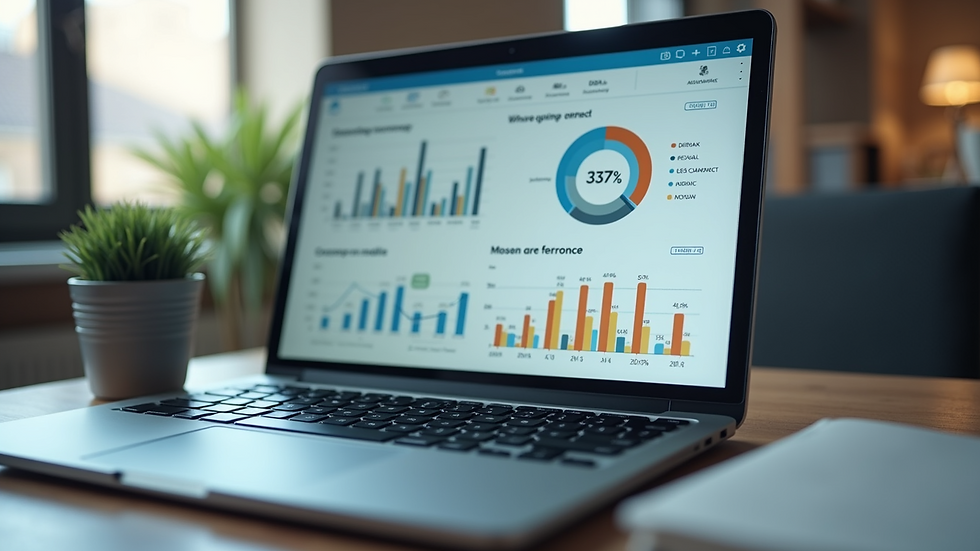Streamline Your Small Business Finances with Expert Accounting
- Denis
- Oct 7, 2025
- 4 min read
Managing finances is one of the most critical aspects of running a small business. Without proper accounting, it’s easy to lose track of expenses, miss tax deadlines, or mismanage cash flow. This can lead to costly mistakes and even jeopardise the future of your business. Fortunately, expert accounting can help you streamline your financial processes, giving you more time to focus on growth and customer satisfaction.
In this article, we will explore practical ways to improve your small business accounting, discuss the best accounting packages available, and explain how professional support can make a difference. Whether you are just starting out or looking to optimise your current system, these insights will help you take control of your finances.
Why Accounting for Small Businesses is Essential
Accounting is more than just bookkeeping. It involves tracking income and expenses, preparing financial statements, managing payroll, and ensuring compliance with tax laws. For small businesses, accurate accounting is essential because:
It provides a clear picture of financial health. Knowing your profit margins, cash flow, and liabilities helps you make informed decisions.
It simplifies tax preparation. Proper records reduce errors and the risk of penalties.
It supports business planning. Financial data helps you forecast growth and budget effectively.
It builds credibility. Accurate accounts are important when seeking loans or investors.
For example, a small retail shop that tracks daily sales and expenses can quickly identify which products are most profitable. This insight allows the owner to adjust inventory and marketing strategies accordingly.

How Expert Accounting Can Transform Your Business
Hiring an expert accountant or using professional accounting services can bring numerous benefits to your small business:
Time savings. Outsourcing accounting frees up your time to focus on core business activities.
Accuracy and compliance. Professionals stay updated on tax laws and regulations, reducing the risk of mistakes.
Financial insights. Accountants can analyse your data and provide advice on cost-saving and growth opportunities.
Improved cash flow management. They help you plan payments and collections to maintain healthy cash flow.
For instance, a small consultancy firm that uses expert accounting services can receive monthly reports highlighting overdue invoices and upcoming tax deadlines. This proactive approach prevents cash shortages and penalties.
If you want to explore reliable options, consider small business accounting services that specialise in supporting businesses like yours.
Which Accounting Package is Best for a Small Business?
Choosing the right accounting software depends on your business size, industry, and specific needs. Here are some popular options:
QuickBooks Online
User-friendly interface
Cloud-based access
Invoicing, expense tracking, and payroll features
Suitable for most small businesses
Xero
Strong integration with banks and apps
Real-time financial reporting
Multi-currency support
Ideal for businesses with international clients
Sage Business Cloud Accounting
Scalable for growing businesses
Automated bank feeds
VAT management tools
Good for UK-based small businesses
FreeAgent
Designed for freelancers and small businesses
Simple invoicing and time tracking
HMRC-approved for Making Tax Digital
Great for sole traders and contractors
When selecting software, consider factors such as ease of use, cost, customer support, and integration with other tools you use. Many providers offer free trials, so take advantage of these to test which platform fits your workflow best.

Practical Tips to Streamline Your Small Business Finances
Implementing efficient accounting practices can save you time and reduce stress. Here are actionable recommendations:
Keep personal and business finances separate. Open a dedicated business bank account to simplify tracking.
Record transactions promptly. Update your books daily or weekly to avoid backlog.
Automate where possible. Use software to automate invoicing, payment reminders, and bank reconciliations.
Maintain organised receipts and documents. Use digital tools to scan and store receipts securely.
Review financial reports regularly. Monthly reviews help you spot trends and address issues early.
Plan for taxes throughout the year. Set aside funds for VAT, corporation tax, and other liabilities.
Seek professional advice. Consult accountants for complex matters like payroll, tax planning, and compliance.
For example, a small café owner who automates invoicing and regularly reviews cash flow reports can quickly identify slow periods and adjust staffing or promotions accordingly.
The Long-Term Benefits of Professional Accounting Support
Investing in expert accounting is not just about compliance; it’s a strategic move that supports sustainable growth. Over time, professional accounting can help you:
Improve profitability. By analysing costs and revenues, accountants can suggest ways to increase margins.
Enhance decision-making. Reliable financial data enables confident business planning.
Reduce financial risks. Early detection of cash flow problems or tax issues prevents crises.
Build stronger relationships with stakeholders. Transparent accounts foster trust with banks, investors, and partners.
Consider a small manufacturing business that partners with an accounting firm. The firm helps implement budgeting tools and forecasts, enabling the business to secure a loan for expansion with confidence.

By embracing expert accounting for small businesses, you can transform your financial management from a source of stress into a powerful tool for success. Whether you choose to use specialised software or hire professional services, the key is to stay organised, informed, and proactive. This approach will help your business thrive in a competitive market and achieve long-term stability.
.png)



Comments